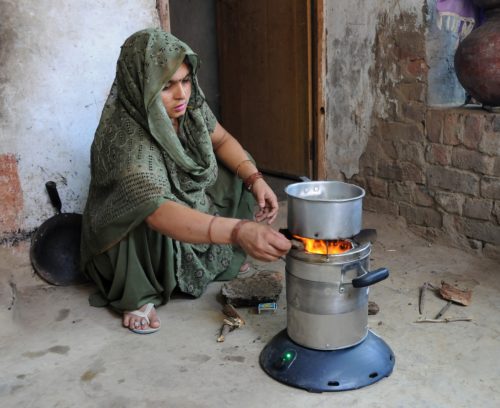Energy Transitions to Benefit Everybody
By Jane O’Flynn, Key Correspondent for The Irish Forum for Global Health

Dr Tami Bond, Professor of Civil and Environmental Engineering at the University of Illinois delivered the keynote address at the recent Pathways to Clean Cooking Conference held in Wexford from May 29-31. Bond’s focus area includes the effective study of black carbon, otherwise known as soot, in the atmosphere. Bond began her presentation with the humbling reminder that since humans have lived in caves, combustion—the burning of wood, has been central to households and human survival. She describes households as complex interconnected systems. The irony of human survival lies in the reliance on solid fuels from knowledge that has accrued for many years.
The cost to health
Uncontrolled combustion in the form of household cooking using solid fuels and kerosene on open fires and inefficient stoves, however, is also detrimental to health. Despite this, it is the reality for 2.8 billion of the world’s population who rely on solid fuels such as wood, dung, crop wastes, charcoal and coal for cooking and heating. As a result of poverty, hundreds of millions of people are likely to rely on fuelwood and other sources of bio-energy to meet their basic needs for decades to come.
Dr Bond highlights the ‘health cost’ of that fact. Each year, there are approximately four million premature deaths caused by uncontrolled combustion. It is currently the top killer of children worldwide. The negative health effects resulting from uncontrolled combustion serve as a cascading inhibiting factor on education and livelihoods for the immediate user, cautions Bond.
The cost to the environment
However, it doesn’t stop there. We are all affected by the emissions from biomass fuels, which contribute to 2-8% of anthropogenic climate impacts. It is estimated that 20-30% of black carbon emissions come from biomass fuels and remain in atmosphere systems. Vast areas of the world continue also to experience diminished air quality.
Therefore, it is indisputable that energy transitions, the transition from open fires and burning of solid fuels to less damaging cooking alternatives, will benefit everybody.
Dr Bond reiterates however, on numerous occasions, that for energy transitions to benefit everybody, they must reach everybody. Successfully transitioning 80% of those reliant on damaging cooking practice is insufficient. Positive, tangible effects lie in reaching that last 20 percent, ‘the furthest behind’.
Lifting people out of poverty
Understanding how transitions occur, essentially the needs of the households one is seeking to engage in clean cooking is central to its success. Countries are not homogenous, nor are households. Dr Bond challenges the clean cooking experts in attendance to appreciate the complexity of the household and to consider factors such as human needs, wants and cultures of households as well as income. She also encourages her peers to dream bigger, think beyond cooking, towards ‘big energy’, energy that heats housing and can provide livelihoods. This is the energy that makes the aspirations of the three billion reliant on damaging cooking practice a possibility, she says, because it encourages education and prosperity and has the potential to lift people out of poverty.
In concluding remarks, Bond calls on participants directly: ‘Let’s get it done people!” and with that her call to action is complete, and the scene is set for a two-day conference that seeks to respond to the challenge of achieving Sustainable Development Goal (SDG) 7.
With only 10 years left to reach SDG 7, which calls for ensuring “access to affordable, reliable, sustainable and modern energy for all”, including universal access to clean cooking, an estimated two billion people are in danger of being left behind.
Tami Bond is professor of Civil and Environmental Engineering at the University of Illinois, and an affiliate professor of Atmospheric Science. Bond has focused on the effective study of black carbon or soot in the atmosphere. She is a current MacArthur Fellow, which was awarded to her in 2014.
CATEGORIES
- Restore Humanity Campaign
- Equity in Action Blog
- Training Programmes
- Sponsorship
- Vaccine Equity
- Get Global – Global Health Talks
- Student Outreach Team
- Get Global Young Professionals Talk Global Health
- Global Health Matters – Live Event Series
- Global Health Matters – IGHN Live Event Series
- An initiative of Irish Global Health Network
- ESTHER Ireland and ESTHER Alliance for Global Health Partnerships
- Global Health Matters – Webinar Series
- ESTHER
- IGHN Conferences
- Global Health Conference 2020
- Women in Global Health – Ireland Chapter
- ESTHER Partnerships
- Weekly Webinar Series
- 4th Global Forum on HRH
- Access to Medicines
- Archive Page Weekly COVID Webinars
- Clean Cooking 2019
- Climate Change and Health Conference 2017
- Conference Abstracts
- Conference Materials
- Covid FAQ
- COVID Funding Opportunities
- COVID-19
- COVID-19: Gender Resources
- Dashboard and online resources
- Education
- ESTHER Alliance
- Events
- Events & News
- Funding covid
- Global Health Exchange 2018
- Global Health Exchange 2019
- Global Health symposium 2019
- Health Workforce/HRH
- Homepage Featured
- Homepage recent posts
- IFGH 2011-2012 Conference and Events
- IFGH 2014 Conference
- IFGH Multimedia
- Irish AIDS Day 2017
- Irish News and Feeds
- Key Correspondent Articles
- Key Correspondent News
- Maternal Health
- Multimedia
- News
- News & Events
- Newsletter
- Opportunity
- Our LMIC's Resources for COVID19
- Partner Country News and Feeds
- Past Events
- Policy
- Presentations
- Recurring events
- Reports & Publications
- Research
- Resources
- Student Outreach Group
- Students Corner
- TEDTalks
- TRAINING COURSES FOR HEALTH CARE PROFESSIONALS
- Uncategorized
- Upcoming Events
RECENT POSTS

Impact testimonies- Lombani

Impact Testimony – Shadrick

Power, Inequality, Decolonisation – and Living My Recovery By Bronwyn April

Global Health Without Borders: Reflections on the Power of Diverse Voices

IGHNxEU – Empowering Women for a Healthier Europe

